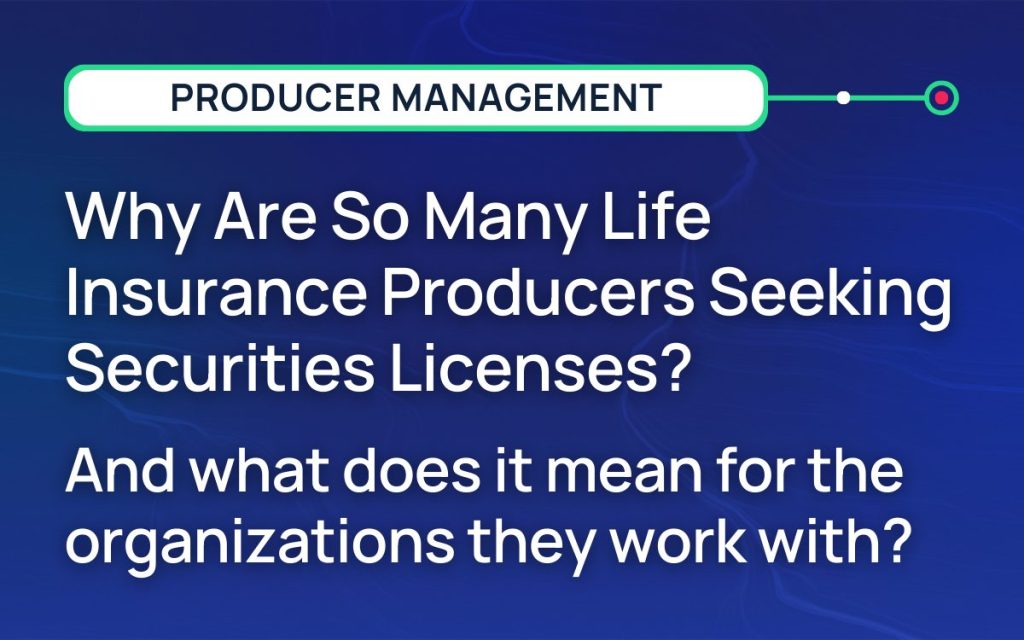Why Are So Many Life Insurance Producers Seeking Securities Licenses?

Are two really better than one? Insurance producers seem to think so. There’s a trend forming in the insurance industry of insurance producers acquiring securities licenses (and vice versa), leading to an influx of dually licensed financial professionals. What are the factors driving this trend and what does it mean for the insurance organizations working with these individuals?
Why would a producer want to become dually licensed?
One main reason insurance producers get their securities license is so they can sell variable lines products like variable annuities and variable life insurance. While these products are more complex (hence the additional licensing requirements needed to sell them), their sales often come with higher commissions, making them attractive sales opportunities.
And in case you haven’t heard, the annuity market is currently booming due to rising interest rates and market volatility driving annuity sales through the roof. The high sales are expected to continue for years into the future as interest rates remain high and a large number of baby boomers reach retirement age.
Brokers who are licensed to sell variable annuities and other securities-based products have a unique opportunity to capitalize on the growing demand. But, there may be more than money motivating today’s producers to become dually licensed.
Not all producers need a securities license…for now
Some agents consider getting their securities license not only to sell security products but also to guarantee they can continue to sell the non-security insurance products they currently do well into the future. Sounds cryptic, but let’s break it down.
As of now, the only reason an agent needs a securities license is to sell insurance products that are also classified as securities products (aka variable life and variable annuities). But what if that changed?
That’s exactly what producers were afraid of when the SEC adopted Rule 151A. Had it passed, Rule 151A would have reclassified fixed indexed annuities as securities products, thereby prohibiting any non-securities licensed insurance agent from selling these types of annuities until they became licensed to do so.
Producers whose income relied on selling indexed annuities were relieved when the rule was struck down in the courts and didn’t come to fruition. However, because of the general complexity of annuity products, some insurance industry professionals are hesitant to rule out a future in which all producers are required to be dually licensed to sell indexed annuities.
Avoid regulatory action
For some agents, especially those who sell non-security based annuities like fixed indexed or fixed annuities, the push to become dually licensed stems from a desire to avoid getting into hot water with the SEC.
Investors who purchase fixed or fixed indexed annuities may have questions for their agent regarding variable annuities, like whether they are a good investment. And while it may seem like no big deal for a producer to answer these questions based on what they know of their client’s long-term financial goals, they may need a securities license to legally do so.
Without having passed a FINRA-administered Series exam, producers who offer securities recommendations, discuss the pros and cons of different security-backed products, or engage in any other conversation that could persuade a client to invest are walking a fine line.
If a producer is caught advising clients on security products without the proper license to do so, Even if their advice fairs well for a client, breaking the law in this way could put a producer at risk for fines, suspension, license revocation, or, in extreme circumstances, criminal charges.
How can organizations prepare to work with more dually licensed brokers?
For life insurance carriers that want to capitalize on the variable lines market, attracting dually licensed brokers will be a high priority. Carriers and MGAs/MGUs that can establish themselves as a preferred distribution partner for these individuals will have the upper hand when it comes to recruiting and keeping them.
More complex compliance requirements
Compliance management for dually licensed brokers is a little more complex than for those without a securities license. Not only are you dealing with the nuanced, state-based regulatory framework of the insurance industry, but you’re also dealing with additional oversight from FINRA and the SEC.
These additional regulatory requirements only add more paperwork and forms for brokers and the organizations they work with to keep track of if they hope to remain compliant.
To make matters more complicated, variable insurance products fall pretty high on the list of investor complaints FINRA receives each year. Organizations working with dually licensed brokers need to prioritize compliance management if they want to avoid ending up on the list and facing the associated consequences.
How to better manage variable lines broker compliance
One way to support variable lines brokers is by optimizing tedious processes for them. From onboarding to termination, the broker lifecycle typically involves a ton of data collection. Carriers who put the burden on recruits to track down the most accurate, up-to-date data won’t make a great first impression. Not to mention, sending brokers on a paper chase takes them away from revenue-generating tasks.
Automating processes can help variable lines brokers escape the seemingly endless loop of data collection and focus more on building client relationships and selling products. Not only does this have a positive impact on an insurer’s bottom line, but it also helps set carriers and MGA/MGUs up as a first choice distribution partner for dually licensed brokers.
Don’t let the opportunity pass you by
While demand for annuities and variable products is on the rise now, and future predictions point to continued growth, there’s no saying for sure how long the window of opportunity will stay open.
Organizations that can manage compliance for dually licensed brokers will be better positioned to take advantage of the current market growth and capitalize on it.
AgentSync Manage offers enhanced variable insurance support that unifies FINRA and NIPR data into a single profile, providing a consolidated view of broker eligibility for informed decision-making, accelerated onboarding, and compliance.
To see how AgentSync can help your carrier, MGA, or MGU attract and manage a growing number of dually licensed brokers, contact us or book a demo today.

